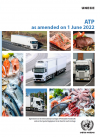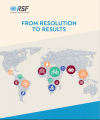Publications
Displaying Results 1 - 20 of 40
- English
The Agreement on the International Carriage of Perishable Foodstuffs and on the Special Equipment to be Used for such Carriage (ATP) was done at Geneva on 1 September 1970 and entered into force on 21 November 1976.
The objectives of the ATP are to facilitate international transport of perishable foodstuffs and to ensure a high level of preservation of the quality of perishable foodstuffs during
- English
UNRSF is playing a catalytic role in transforming investments for road safety and changing world views to understand how road safety transcends many other SDGs.
In West Africa, 15 countries received support which ultimately resulted in the celebrated adoption of a single environmental used car standard with embedded important road safety requirements.
In Brazil, the road traffic rule enforcement
- English
The rapid development of high-speed rail (HSR) networks has been observed worldwide in recent years. The experience of states operating these systems demonstrates that they are setting new standards of quality and contributing to the renaissance of railway as a mode of transport. The development of an HSR network in the TER region would significantly improve the competitiveness of rail,
- Pусский
В последние годы во всем мире наблюдается стремительное развитие сетей высокоскоростных железных дорог (ВСЖД). Опыт государств, эксплуатирующих эти системы, показывает, каким образом они устанавливают новые стандарты качества и способствуют возрождению железных дорог как одного из видов транспорта. Развитие сети ВСЖД в регионе ТЕЖ позволит значительно улучшить конкурентоспособность
- Français
Le transport ferroviaire à grande vitesse se développe rapidement partout dans le monde depuis plusieurs années. Dans les pays qui mettent en place ce type de services, on observe que la grande vitesse, grâce à ses normes de qualité élevées, contribue au renouveau du chemin de fer. La création d'un réseau à grande vitesse dans la région du TER renforcerait considérablement la compétitivité du
- English
The construction and maintenance of road infrastructure is an important area of most countries’ national economies, but also one of the least digitized sub-sectors. It suffers from the presence of systemic shortcomings including an insufficient level of cooperation, inadequate information management, and limited investment in technology, research and development. These shortcomings often result
- English
The Trans-European North-South Motorway (TEM) Project was initiated to facilitate road traffic in Central, Eastern and South-Eastern Europe and to assist with the process of integrating European transport infrastructure systems.
One of the objectives of the Project is to improve the road network’s management. This report aims to provide TEM member countries with up-to-date information about how
- English
The Trans-European North-South Motorway (TEM) Project was initiated to facilitate road traffic in Central, Eastern and South-Eastern Europe and to assist with the process of integrating European transport infrastructure systems.
In order to improve the road network’s management, the Project provides TEM member countries with benchmarking of the current capacities of asset management, with up-to-
- English
While the second half of 2020 was marked by the warranted fight against the COVID-19 pandemic which continued to change the face of the world, our ambitions for a better global road safety were not scaled back. COVID-19 has taught us to move away from the “silo mentality” and instead align development goals with each other - resulting in higher impact policies and programs.
- English
The UN Road Safety Fund was established in 2018 as a UN multi-partner trust fund pursuant to the General Assembly resolution 70/260 and with the support of the UN Secretary-General. It aims to help low- and middle-income countries put in place an effective national Safety System to substantially
- English
Updated Guidelines on the use of the UNRSF brand and logo
- English
The UNRSF launches the second issue of its newsletter at a time when the world continues to face unprecedented change and disruptions due to the Covid-19 pandemic. However, the momentum gained with the 3rd Global Ministerial Conference on Road Safety in February 2020 where the Stockholm Declaration was launched with an ambitious target to reduce road deaths and injuries by 50% by 2030 must not
- English
The UN Road Safety Fund’s (UNRSF) secretariat seeks additional financial support from private and public sector donors where the Fund’s mission and donor priorities are aligned. Read more in the UNRSF donor brochure to consider becoming a donor.
Contact the UNRSF secretariat for more information at unrsf_secretariat
- English
The UNRSF 2019 Annual Report is now available. Established two years ago as an innovative United Nations pooled fund, the Annual Report showcases the first concrete results of the UNRSF and thus demonstrates its potential to meet its ambition to substantially reduce death and injuries from road crashes in low and middle-income countries where 93% of the world fatalities occur.
- English
Organizations around the world are quickly adapting their programme and project activities to respond to the COVID-19 pandemic and its consequences. The UN Road Safety Fund is committed to the principles of adaptive programming, partnerships, and relevance. The operationalization of these principles is even more critical during this unparalleled time. This flyer provides tools and tips for
- English
The April 2020 marks the second anniversary of the launch of the United Nations Road Safety Fund (UNRSF). The Fund is now financing 15 projects in 20 low- and middle-income countries to substantially reduce death and injuries from road crashes and to reduce economic losses resulting from these crashes.
- English
ECE/TRANS/290,
Sales No. E.20.VIII.2,
ISBN 978-92-1-117241-6,
Price: US$ 35,
Languages: E, F, R
The Agreement on the International Carriage of Perishable Foodstuffs and on the Special Equipment to be Used for such Carriage (ATP) was done at Geneva on 1 September 1970 and entered into force on 21 November 1976.
The objectives of the ATP are to facilitate international transport
















